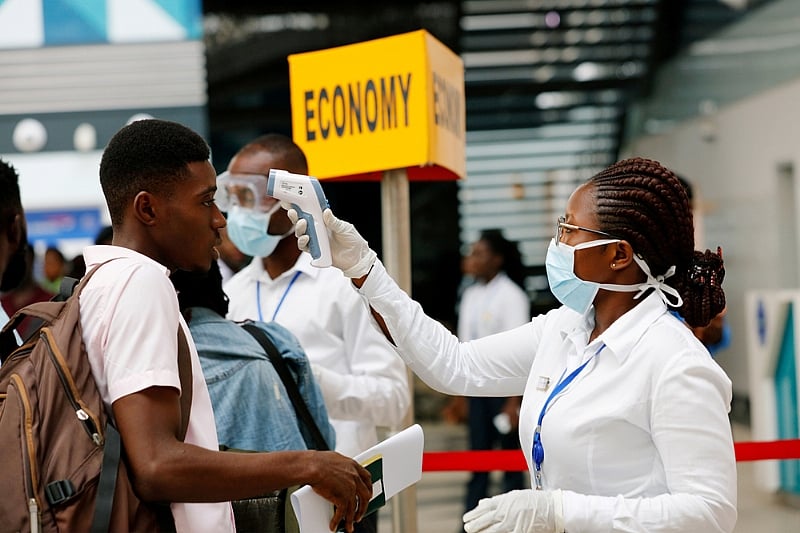
[ad_1]
When COVID-19 devastated China and other developed countries, Africa’s preparedness and capacity for the impending pandemic raised concerns. However, Africa is currently behind many developed countries when it comes to the number of victims of the pandemic. As the continent experiences the third wave of the pandemic, Africa is unlikely to witness scenes of overwhelmed health centers in some parts of the world.
COVID-19 has not created most of the challenges Africa faced during the pandemic, however, it has exposed long-standing and evolving crises on the continent. For example, health systems in Africa were already fragile before the pandemic. Pre-existing frameworks, such as the Abuja Declaration and the African Health Strategy 2016-2030, have not been sufficient to finance health. Since 2001, when the AU set the target of spending 15% of the government budget on health in any given year, only a few countries have achieved it.
Beyond the current challenges, the COVID-19 pandemic offers a unique opportunity to reinvent Africa’s fragile health system and the growing digital ecosystem.
Transforming the health system across Africa
The pandemic has brought back the long-standing challenges of insufficient national financial commitment, inadequate infrastructure and the continuing problem of brain drain. In addition, the current diversion of limited health resources to combat the effects of the COVID-19 pandemic has disrupted other programs to fight diseases such as malaria, tuberculosis (TB) and HIV / AIDS which remain among the leading causes of death in Africa. According to the WHO, 14 African countries have experienced a decline of more than 50% in services, ranging from providing skilled birth attendants to treating malaria cases in May-July 2020 alone.
Africa currently suffers disproportionately from the constraints of global vaccine production, as its dependence on external suppliers exposes it to the effects of vaccine nationalism and disruptions in the international supply chain. Only 1% of vaccines used in Africa are manufactured on the continent and as of May 3, 2021, of the more than 1.16 billion doses of COVID-19 vaccine that have been administered worldwide, Africa, which represents 17, 6% of the world’s population had administered only less than 2%.
African governments have responded to the COVID-19 pandemic earlier and faster than most developed countries. In addition, continental collaborations have been enhanced to protect the continent from the virus. For example, after the first confirmed case of COVID-19 in Africa was reported in Egypt on February 14, 2020, the African Centers for Disease Control and Prevention (AfCDC) established the African Coronavirus Working Group (AFTCOR ) to help Member States build and expand testing capacity. As a result, diagnostic capacity has grown from two countries, Senegal and South Africa, in February 2020 to over 43 at the end of March 2020. All African countries now have laboratory testing capacity for coronavirus.
However, these coordinated efforts must be sustained beyond the current pandemic if the impacts of the efforts are felt in the near future. The pandemic provides an opportunity to revisit pre-existing primary health care structures, the 2001 Abuja Declaration and investment in digital and innovative health systems.
Growing digital transformation
Africa’s digital transformation was increasing rapidly before the COVID-19 pandemic. Africa is currently home to the world’s fastest growing broadband connections. In addition, online businesses have seen an increase in revenues, for example, online retail revenues have doubled since 2010. However, many sectors such as education and governance in Africa have not been witnesses of the impact of digitization.
The pandemic has provided further evidence of Africa’s vast digital potential, with governments leveraging technology to adapt to the pandemic situation, for example through telemedicine services. In the recovery, governments can draw on a young generation of digital entrepreneurs adapting to new global conditions. More than 640 technological poles are active across the continent. Harnessing this potential presents an opportunity to stimulate the economy and jump over existing challenges.
FinTechs hold real promise and could be used to provide basic financial services to informal workers. Africa already has the largest number of mobile money accounts in the world at 300 million, while 72% of Africans now regularly use mobile phones.
However, the digital leap is easier said than done. For Africa to truly realize its digital potential, the digital divide must be overcome, digital infrastructure must be expanded, investments in skills development must be scaled up and policies put in place that reflect the new digital reality.
Whether Africa will emerge stronger and better from the COVID-19 pandemic does not depend entirely on the impact of the pandemic, but on the immediate and future actions of leaders in the public and private sectors. While the immediate need is to find ways to reopen and revive the economy as quickly as possible, the long-term opportunities that the pandemic offers to strengthen health systems and accelerate digitization in Africa should not be overlooked.
Aderinto Nicholas is a 2021 Africa Liberty Writing Fellow
Source link